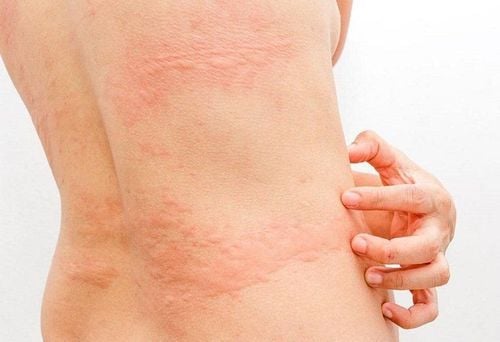This is an automatically translated article.
Article by Master, Doctor Mai Vien Phuong - Gastrointestinal endoscopist - Department of Medical Examination & Internal Medicine - Vinmec Central Park International General Hospital.
Chronic idiopathic urticaria is a chronic rash of red or scaly bumps on the skin that lead to itching. People with chronic idiopathic urticaria often have flare-ups over several years. There is currently no clear cause for chronic idiopathic urticaria, but here are some potential triggers that you should be aware of to better understand the condition.
1. Stress and anxiety can be triggers for chronic idiopathic urticaria
Not all triggers of chronic idiopathic urticaria are physiological. They can also be psychological, stemming from stress or anxiety. Your mental state can play an important role in the manifestation of symptoms, so reducing your stress levels can also control symptoms.
If you find yourself anxious all the time, try some stress-relieving activities like meditation, breathing exercises, or yoga.
2. Scratching is the cause of urticaria
Although scratching an itchy area may provide temporary gratification, it can trigger chronic idiopathic urticaria.
Scratching can lead to a vicious cycle in which you are more aware of the itch and can't stop yourself from focusing on it. This leads to more scratching and even worse hives.
3. Your pet
If you notice the appearance of a rash around certain animals, pet dander could be the cause of the hives.
You don't have to be in direct contact with the animal for a reaction to occur. Skin flakes may fall off in places accessible to animals, which is enough to cause a reaction.
4. Outdoor exposure
Being outside during the summer can cause chronic idiopathic urticaria. Pollen, insect bites, and the heat of the sun can all lead to an itchy, rash on your skin.
To limit these agents, apply insect spray, wear long sleeves and long pants to prevent insect bites. Consider wearing a hat to protect yourself from the sun.
On the other hand, the cold associated with winter (or cold conditions like swimming pools) can cause flare-ups in some people. Ask your doctor to test ice cubes to see if an allergic reaction occurs. If it is found that cold is the cause, your doctor will make appropriate recommendations, including protecting your skin in cold temperatures.
5. Other diseases
Runny nose and hives are related. Anything from a viral respiratory infection to a dental infection can be a trigger. See your doctor for treatment as soon as possible to avoid making your hives worse.
6. Exercise
Exercise, especially vigorous exercise that can make you sweat, could be the cause of your chronic idiopathic urticaria.
You don't have to stop exercising completely, but talk to your doctor about how to manage symptoms. They may recommend low-impact exercises like cycling, swimming, or yoga. These exercises won't make you sweat, but they still keep your body moving.

7. Your menstrual cycle
Hormones related to your menstrual cycle may play a role in triggering hives. If you notice that outbreaks of hives seem to occur around the same time as your period on a regular basis, it may not be a coincidence. See your doctor for proper treatment.
8. Wearing clothes that are too tight
Clothes that are too tight can be a cause of chronic idiopathic urticaria. Instead, try to choose loose and comfortable clothing.
In summary, one of the best ways to find out what is causing the exacerbation of chronic idiopathic urticaria symptoms is to keep a follow-up diary. Keep a record of the date of onset, intensity of symptoms, and any unusual activity. You may never be able to completely control the symptoms of chronic idiopathic urticaria, but understanding the factors can help you prevent more frequent flare-ups.
Please dial HOTLINE for more information or register for an appointment HERE. Download MyVinmec app to make appointments faster and to manage your bookings easily.
References:
AAFA Community Service. (2017). Hives that won't go away: CIU basics. Community.aafa.org/blog/chronic-idiopathic-urticaria-hives-that-won-t-go-away-allergy to animals: An overview. (2017). ncbi.nlm.nih.gov/books/NBK447109/ Deacock SJ. (2008). Approach to the patient with urticaria. DOI: 10.1111 / j.1365-2249.2008.03693.x Urticaria (urticaria). (nd). acaai.org/allergies/types-allergies/hives-urticaria














